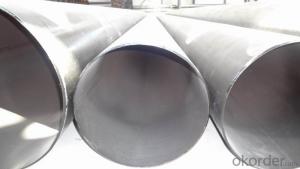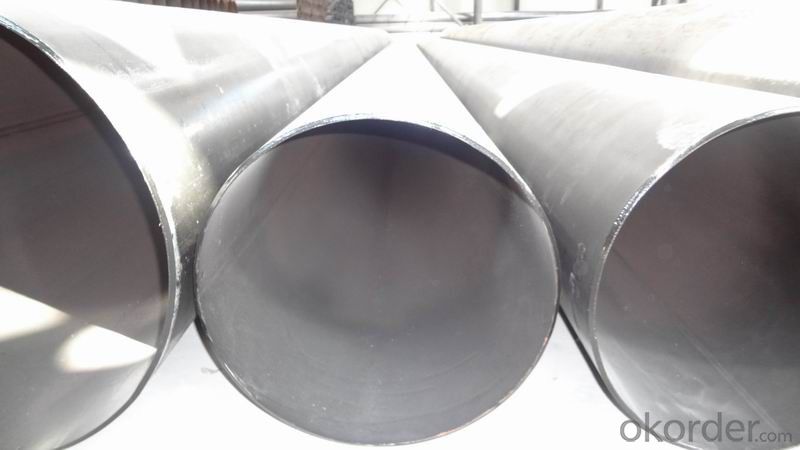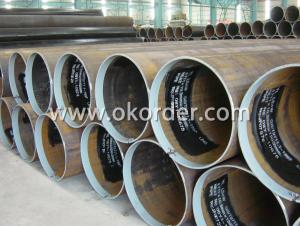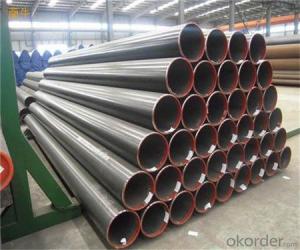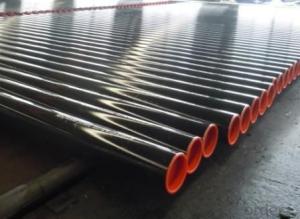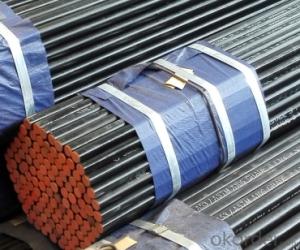API 5L LSAW STEEL PIPE
- Loading Port:
- China Main Port
- Payment Terms:
- TT OR LC
- Min Order Qty:
- -
- Supply Capability:
- -
OKorder Service Pledge
OKorder Financial Service
You Might Also Like
LSAW Steel Pipe
1 Size: 219-3200 mm*5-25.4mm
2 Material Q235/Q345/20#/X42-X65/J55 etc
Standard:
EN-10208-1/2, GB9711.1/2 etc.
Steel Grade:
B, X42 up to X70; L245, L290 up to L48
Usage:
Used for Steel Structure
Size:
LSAW from 219.1mm to 3200mm, thickness from 5mm to 25.4mm
Ends: Beveled ends with protector
Surface:
Bare / Varnish coating / FBE, 3PE coating DIN30670 / or by client option
Packing:
Casing, bundled shipping in containers or by break bulk vessel
Process | Longitudinal Submerged- Arc Welded Steel Pipe (DSAW -Double Submerged arc welded) |
Usage | Used for liquid delivery, such as water, gas, and oil; construction and piling |
Standard | API 5L(PSL1,PSL2), ASTM A252,EN10217, EN10219,KS F4602, KS D3583, BS, JIS, IS |
Certificate | ISO 9001:2008, ISO 14001, ISO 18001, API 5L (PSL1, PSL2),EN10217, EN10219 and so on. |
Outside Diameter | 323.9 mm-2134 mm (12"-84") |
Wall Thickness | 6 mm - 80mm |
Length | 6 – 14 m |
Grade | API 5L: GR A, GR B, X42,X46, X56, X60,X65,X70 ASTM A252 GR 1, GR 2, GR 3 EN 10219: S275, S275JR, S355JRH, S355J2H EN 10224, L235,L275,L355 |
Surface | Fusion bond Epoxy coating, Coal Tar Epoxy, 3PE, Varnish Coating, Bitumen Coating, Black Oil coating as per customer’s requirement |
Test | Chemical Component Analysis, Mechanical Properties (Tensile strength, Yield strength, Elongation), Hydrostatic Test, X-ray Test,Size Inspection. |
Mill Test Certificate | Mill Test Certificate:EN 10204/3.1B |
- Q: How are steel pipes protected against electrolytic corrosion?
- Steel pipes are protected against electrolytic corrosion through a variety of methods. One common method is the application of protective coatings on the surface of the pipes. These coatings act as a barrier, preventing direct contact between the steel and the surrounding environment, which includes moisture and other corrosive substances. Coatings such as epoxy, polyethylene, and zinc are commonly used for this purpose. Another method of protection is the use of sacrificial anodes. Sacrificial anodes are made from a metal that is more reactive than steel, such as zinc or aluminum. These anodes are attached to the steel pipes and, as they corrode over time, they sacrifice themselves to protect the steel. This process is known as cathodic protection and is highly effective in preventing electrolytic corrosion. In addition to coatings and sacrificial anodes, proper insulation and electrical isolation are crucial in protecting steel pipes from electrolytic corrosion. Insulating materials, such as rubber or plastic sleeves, are used to prevent direct contact between the pipes and other metals or electrolytes. Electrical isolation can be achieved through the use of dielectric unions or insulating flanges, which prevent the flow of electric current between different sections of the pipeline. Regular maintenance and inspection also play a key role in protecting steel pipes against electrolytic corrosion. Periodic checks for coating integrity, anode condition, and potential electrical leakage are essential to ensure the continued effectiveness of the corrosion protection system. Overall, a combination of protective coatings, sacrificial anodes, insulation, electrical isolation, and regular maintenance is necessary to protect steel pipes against electrolytic corrosion. By implementing these measures, the lifespan of steel pipes can be significantly extended, ensuring the safety and reliability of various applications such as water distribution, oil and gas transportation, and structural support in buildings and infrastructure.
- Q: Why can't stainless steel be put together with carbon steel tube?
- The bimetallic corrosion is terminated only when one of the three conditions is changed. Galvanic corrosion is related to the contact area of bimetal and the greater the contact area. Corrosion is less. The driving force of galvanic corrosion is the potential difference.[galvanic corrosion] refers to two or more than two kinds of electrode potential of metal in the corrosive medium, and contact with each other caused by electrochemical corrosion, also known as contact corrosion or double metal corrosion.
- Q: How are steel pipes tested for quality assurance?
- Steel pipes are tested for quality assurance through various methods including visual inspection, non-destructive testing (such as ultrasonic testing and magnetic particle inspection), mechanical testing (such as tensile strength and hardness testing), and dimensional checks. These tests help ensure that the pipes meet the required specifications, standards, and safety regulations, ensuring their durability, reliability, and performance in various applications.
- Q: Can steel pipes be used for transporting liquids and gases?
- Yes, steel pipes can be used for transporting both liquids and gases. Steel pipes are known for their durability, strength, and resistance to corrosion, making them suitable for a wide range of applications, including the transportation of fluids and gases. They are commonly used in industries such as oil and gas, water supply, sewage systems, and chemical processing plants. Steel pipes provide a reliable and efficient means of conveying liquids and gases over long distances, ensuring the safe and efficient transportation of these substances.
- Q: What steel pipes are buried for outdoor heating pipes? Seamless or welded tube? Are there any rules for specific countries? Can use the seamed tube?
- The pipe material of heating pipe network should be designed according to the requirement. When the design is not specified, the following requirements shall be met:1 when the pipe diameter is less than or equal to 40mm, welded steel pipe shall be used.2 when the pipe diameter is 50 ~ 200mm, welded steel pipe or seamless steel pipe shall be used.3 when the pipe diameter is greater than 200mm, spiral welded steel pipe shall be used.
- Q: What is the difference between steel pipes and cast iron pipes?
- The main difference between steel pipes and cast iron pipes is the material they are made of. Steel pipes are made from an alloy of iron and carbon, making them stronger and more durable. On the other hand, cast iron pipes are made solely from iron, which makes them more brittle and prone to cracks. Additionally, steel pipes have a smoother interior surface, allowing for better water flow and reducing the chance of clogs. Cast iron pipes, on the other hand, have a rougher interior surface and are more susceptible to corrosion. Overall, steel pipes are typically preferred for their strength and longevity, while cast iron pipes may be used in specific applications where their unique properties are advantageous.
- Q: What are the different types of steel pipe fittings for gas pipelines?
- There are several types of steel pipe fittings commonly used for gas pipelines, including elbows, tees, reducers, couplings, and flanges. These fittings are essential for connecting and directing the flow of gas within the pipeline system.
- Q: How are steel pipes used in the telecommunications infrastructure industry?
- Steel pipes are used in the telecommunications infrastructure industry to provide a strong and durable framework for the installation of fiber optic cables, conduits, and other communication equipment. They are used for underground cable routing, overhead cable support, and the construction of telecommunication towers, ensuring reliable and efficient communication networks.
- Q: What is the thickness of steel pipes?
- The thickness of steel pipes can vary depending on the specific application and industry requirements. However, typical steel pipes used in various industries, such as construction and oil and gas, can have thicknesses ranging from a few millimeters to several centimeters.
- Q: What are the different methods of protecting steel pipes from corrosion?
- There are several methods of protecting steel pipes from corrosion, including coating the pipes with materials such as epoxy, polyethylene, or zinc; applying cathodic protection by using sacrificial anodes or impressed current; and employing corrosion inhibitors to prevent the formation of rust. Regular maintenance and inspections are also crucial in identifying and addressing any potential corrosion issues.
Send your message to us
API 5L LSAW STEEL PIPE
- Loading Port:
- China Main Port
- Payment Terms:
- TT OR LC
- Min Order Qty:
- -
- Supply Capability:
- -
OKorder Service Pledge
OKorder Financial Service
Similar products
Hot products
Hot Searches
Related keywords
